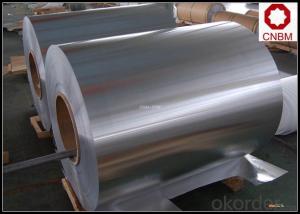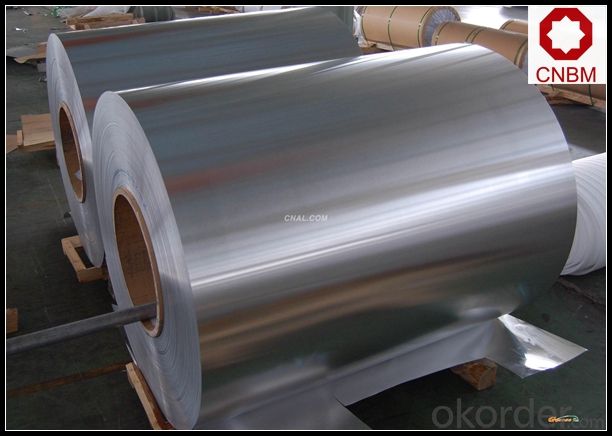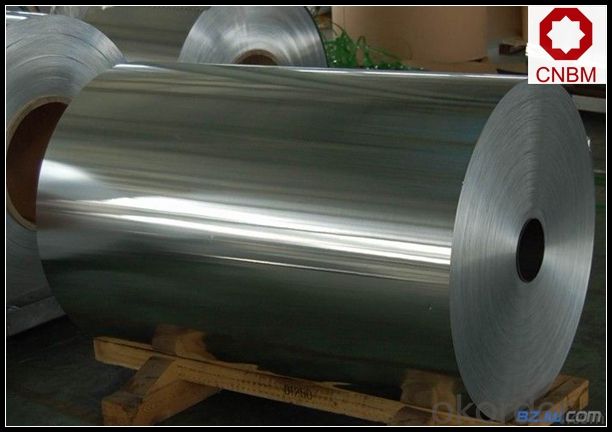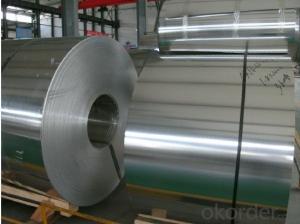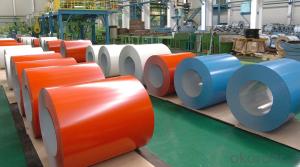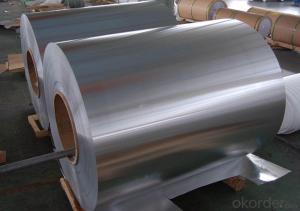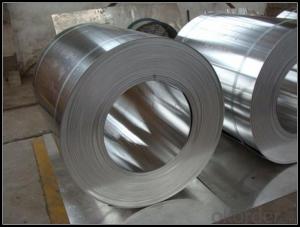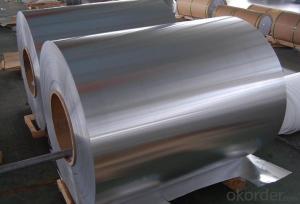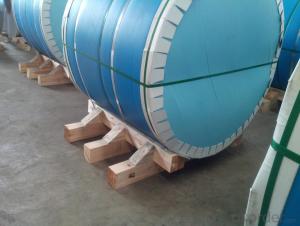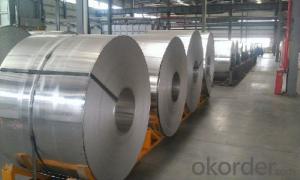Alloy Aluminum Coil 3000 Series Cold Rolled Aluminum Coils 1050 1060 1100
- Loading Port:
- Shanghai
- Payment Terms:
- TT OR LC
- Min Order Qty:
- 5 m.t.
- Supply Capability:
- 10000 m.t./month
OKorder Service Pledge
OKorder Financial Service
You Might Also Like
Specification
1. Specification of Cold rolled aluminum coils 1050 1060 1100
Thickness | 0.1mm-10mm |
Popular Thickness | 0.1mm/0.2mm/0.25mm/0.3mm/0.6mm/0.8mm/1.0mm/1.2mm/1.5mm/2.0mm/3.0mm... |
Width | 20mm-2500mm |
inner diameter | 505mm 508mm 605mm |
Material | 1050,1060,1070,1100,1200,3003,3004,3005,5052,5005,5754,5083 |
Temper | O,H12,H14,H16,H18,H22,H24,H26,H32,H34,H36,H38,H111,H112 |
Surface | mill finish |
Packing | Export standard wooden pallets |
Payment Terms | 100% irrevocable L/C at sight or 30% T/T in advance as deposit,70% balance against the B/L copy |
Minimum Order Quantity | 5000kg |
Delivery time | 15-25 days after receiving L/C or deposit |
Remark | Specific requirement of alloy grade, temper or specification can be discussed at your request |
2. Application of Cold rolled aluminum coils 1050 1060 1100
(1).Interior: wall cladding, ceilings, bathrooms, kitchens and balconies, shutters, doors...
(2).Exterior: wall cladding, facades, roofing, canopies, tunnels,column covers , renovations...
(3).Advertisement: display platforms, signboards, fascia, shop fronts...
3. Feature of Cold rolled aluminum coils 1050 1060 1100
*Such coil is specially designed to replace aluminum ingot, due to the high export tax of aluminum ingot, the coil has better price than ingot.
*This type of coil can fit customer's remelting furnace just like ingot, no need to make any change to the production line that was previously used for ingot. The standard coil size and weight is very suitable for the feed gate of furnace.
*This type of coil causes less material wastage than ingot when remelted.
*Our coil is made directly from ore, no need to go though the ingot making process, quality is much better than other suppliers who use ingot scrap to make coil.
Be free from Oil Stain, Dent, Inclusion, Scratches, Stain, Oxide Dicoloration, Breaks, Corrosion, Roll Marks, Dirt Streaks and other defect which will interfere with use
4. Certificate:
SGS and ROHS(if client request, paid by client), MTC(plant provided), Certificate of Origin(FORM A, FORM E, CO), Bureau Veritas and SGS (if client request, paid by client), CIQS certificate
5. Image of Cold rolled aluminum coils 1050 1060 1100
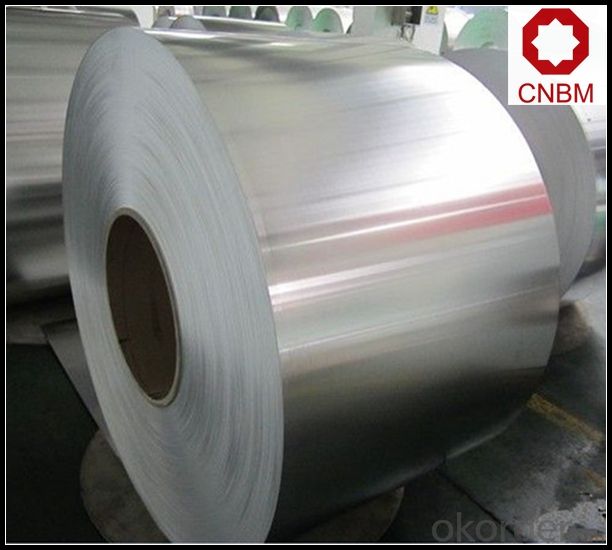
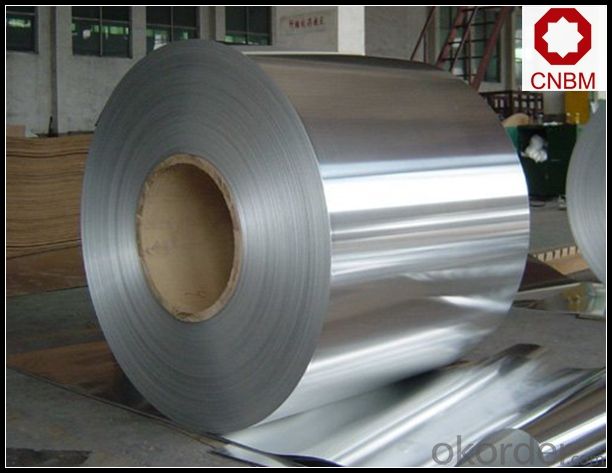
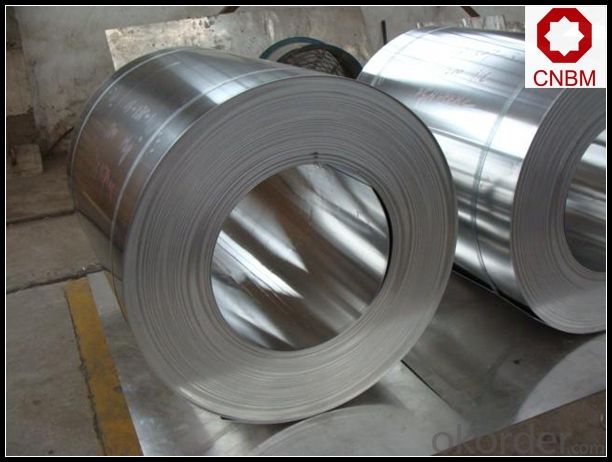
6. Package and shipping of Cold rolled aluminum coils 1050 1060 1100
eye to wall
eye to the wall
with wood pallet (wooded case also available)
7. FAQ
1) What is the delivery time?
Dpends on actual order, around 20 to 35 days
2)What is the QC system:
We have QC staff of 20 persons and advanced equipment, each production is with MTC traced from Aluminum ingot lot.
3) What market do you mainly sell to?
Australia, America, Asia, Middle East, Western Europe, Africa etc
- Q: Describe the various types of coatings applied to steel coils and their applications.
- <p>Steel coils can be coated with several different types of materials to enhance their properties for various applications. Common coatings include: 1) Galvanized coating, which provides corrosion resistance and is used in construction and automotive industries. 2) Pre-painted or color-coated steel, which is coated with organic paint and used for aesthetic purposes in buildings and appliances. 3) Aluminized coating, offering high-temperature resistance and used in heat-treating processes. 4) Zinc-iron alloy coating, which combines the benefits of zinc and iron for enhanced corrosion protection. 5) Organic coatings such as epoxy or polyurethane, used for specific chemical resistance or additional protection in harsh environments. Each type of coating is chosen based on the specific requirements of the end product and the environmental conditions it will face.</p>
- Q: Can aluminum coils be used in electrical transformers?
- Yes, aluminum coils can be used in electrical transformers. While copper is the most commonly used material for transformer windings, aluminum has also been increasingly used due to its cost-effectiveness and lighter weight. Aluminum coils are typically used in distribution transformers, which are smaller in size and operate at lower voltages. However, there are certain considerations to bear in mind when using aluminum coils in transformers. Aluminum has a lower conductivity than copper, so the aluminum coils need to have larger cross-sectional areas to compensate for this. Additionally, aluminum has a higher coefficient of thermal expansion than copper, so proper precautions must be taken to account for the differential thermal expansion between the aluminum windings and other transformer components. Overall, aluminum coils can be a suitable choice for specific transformer applications, but the design and manufacturing process must be carefully executed to ensure optimal performance and reliability.
- Q: Can aluminum coils be used in aerospace heat exchangers?
- Aerospace heat exchangers can indeed utilize aluminum coils. In the aerospace industry, aluminum is widely employed due to its lightweight nature and exceptional thermal conductivity. Heat exchangers play a critical role in aerospace systems by transferring heat between different mediums. Aluminum coils effectively conduct heat, making them suitable for aerospace heat exchangers. Moreover, aluminum's resistance to corrosion is essential in the challenging environments encountered in aerospace applications. Additionally, its low density contributes to fuel efficiency by reducing the overall weight of aircraft. Hence, aerospace heat exchangers prefer aluminum coils owing to their outstanding thermal conductivity, lightweight properties, and corrosion resistance.
- Q: Is it possible to utilize a press machine to bend aluminum coils?
- <p>Yes, you can use a press to bend aluminum coils. Presses are versatile machines capable of bending various materials, including aluminum. However, it's crucial to select the appropriate press type and size for the specific coil dimensions and desired bend. Additionally, ensure the press has the necessary tonnage to handle the bending force required for aluminum. Using the right dies and lubrication can also improve the bending process and prevent damage to the coils. Always follow safety guidelines and consult with equipment specifications to ensure the press is suitable for bending aluminum.</p>
- Q: Are there any recycling programs for used aluminum coils?
- Yes, there are recycling programs available for used aluminum coils. Many recycling centers and scrap yards accept aluminum coils for recycling, as aluminum is a highly recyclable material.
- Q: When you open an aluminum beverage can, do particles of aluminum get into the drink?
- Most aluminum cans these days have a thin polymer coating inside that keeps the aluminum from being exposed to the (usually acidic) soft drinks. Aluminum also inevitably has a thin unreactive oxide layer on its surface. (This can be attacked by liquids, but they must be very acidic.) The only exposed aluminum surface when you open the can is around the hole created by the pull-tab. That has a very low surface area and is quickly coated with the unreactive oxide too. Aluminum content in the drink is consequently very low.
- Q: Can aluminum coils be anodized for enhanced durability?
- Yes, aluminum coils can be anodized to enhance their durability. The anodizing process creates an oxide layer on the surface of the aluminum, making it more resistant to corrosion, wear, and abrasion. This improves the overall lifespan and performance of the coils.
- Q: What are the environmental benefits of using aluminum coils?
- The environmental benefits of using aluminum coils include their high recyclability, low carbon footprint, and energy efficiency. Aluminum is one of the most recycled materials in the world, reducing the need for mining and extraction of new raw materials. Recycling aluminum coils requires significantly less energy compared to making new ones from scratch, resulting in reduced greenhouse gas emissions. Additionally, aluminum coils have excellent heat transfer properties, enabling more efficient cooling and heating systems, which ultimately reduce energy consumption and contribute to a greener environment.
- Q: Can aluminum coils be used in the production of aluminum downspouts?
- Certainly, aluminum coils have the potential to be employed in the manufacturing process of aluminum downspouts. Normally, high-grade aluminum alloy is utilized to fabricate aluminum coils, which are subsequently transformed into thin sheets by means of rolling. These sheets can be conveniently cut and molded into diverse dimensions and forms, including downspouts. The lightweight, long-lasting, and corrosion-resistant characteristics of aluminum make it a favored option for downspouts. Moreover, aluminum coils can be effortlessly manipulated and shaped according to precise design prerequisites, rendering them appropriate for the production of aluminum downspouts.
- Q: What are the various classifications of aluminum coil grades?
- <p>Aluminum coils are classified into different grades based on their composition and properties. The most common grades include 1000 series (99% pure aluminum), 3000 series (aluminum-manganese alloys), 5000 series (aluminum-magnesium alloys), and 6000 series (aluminum-silico-magnesium alloys). Each series has specific characteristics, such as corrosion resistance, formability, and strength, which determine their suitability for various applications like construction, transportation, and packaging. Additionally, there are 2000 series (aluminum-copper alloys), 4000 series (aluminum-silicon alloys), 7000 series (aluminum-zinc-magnesium alloys), and 8000 series (other alloys), each with unique properties and applications.</p>
Send your message to us
Alloy Aluminum Coil 3000 Series Cold Rolled Aluminum Coils 1050 1060 1100
- Loading Port:
- Shanghai
- Payment Terms:
- TT OR LC
- Min Order Qty:
- 5 m.t.
- Supply Capability:
- 10000 m.t./month
OKorder Service Pledge
OKorder Financial Service
Similar products
Hot products
Hot Searches
Related keywords
